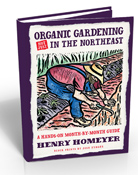Minimizing Work in the Vegetable Garden
Getting older? Too busy with kids, dogs and a job? Don’t give up the idea of having a vegetable garden. Just simplify, minimize and be smart about how much you take on. Here are some ideas about what you can do to minimize work in the garden and still have the joy of ripe, red tomatoes or carrots just pulled moments before eating.

Grow what you really love, and forget about the rest.
First, be not so ambitious. A garden 10 feet by 12 feet will do. Grow what you really love, and forget about the rest. If you had a weedy 20-by-20 garden last summer, cut it in half this year. Cover half with black plastic and then a layer of straw (so it looks better and doesn’t have pools of water for mosquitoes to breed in).
Buy seedlings instead of starting plants in the house. And just because you buy a 6-pack of tomatoes doesn’t mean you have to plant them all. Give some away √ or put the extras in the compost.
Don’t rototill. Rototilling is hard work, and it brings up a lot of buried weed seeds that will make work for you every year. Hoe up the soil to make mounded, wide raised beds, 30 inches wide and 6 inches taller than your walkways. Keep them in place from year to year.
Add compost each year to improve the soil, and stir it in a little. It does its magic best near the surface of the soil where the roots are. I like a CobraHead weeder (www.CobraHead.com) for stirring in compost. Buy compost – by the bag or by the truck load. It’s worth every penny.
Mulch saves labor. Mulch with 6 sheets of this newspaper, and then cover it with hay, straw or grass clippings. Get the walkways done right away, as soon as you have the beds made. Then July 4th weekend, when the soil is warm and your plants are established, mulch around the plants. Mulch also holds in moisture.
Only water when the soil is dry. A little drought stress is not bad – it lets plants know they have to produce seeds – and food for you – as an easy life is not guaranteed. Buy a watering wand so you can water the roots, not the tops of the plants. That will minimize fungal diseases. Dramm is a brand that works real well for me. Water deeply, and less often.
Use tomato cages, and install them at planting time, not after the plants get big. Plants that flop over and lay on the ground don’t produce well. Tying to a stake is fine, but more labor intensive.
Look for a new tomato variety called “Defiant.” It is claimed to be highly resistant to the late blight that came early in 2009, melting vines and fruit. No point in growing tomatoes if the blight gets them. Grow at least one Sun Gold cherry tomato. It is tremendously productive, and the tastiest snack food in town.

Lettuce
Plant lettuce once a month, all summer. Start with a 6-pack from the garden center, or sprinkle a few seeds directly in the ground. If starting from seed, transplant them when 3-4 weeks old so they are 6 inches apart. Or just thin them out. Planted too close together they’ll never get to be big, juicy heads of lettuce.
Pole beans are great. You don’t have to bend over to pick them. And they produce most of the summer, once they have begun. Bush beans are good, but produce just one big crop of beans, then quit.
Don’t plant 6 zucchini. One is enough. “Romanesco” is a great variety – it is still tasty and not mealy when it gets big – and they seem to turn into small bombs overnight.
Potatoes are easy and wonderful. Kids love to dig them. Picking potatoes is like going fishing – and knowing you≠ll catch trout. Just pick the potato bugs every day in June, and they won’t be a problem. Look on the underside of leaves for orange egg masses and scrape them off, too. Drown in soapy water.
Rhubarb is easy, so grow some. It comes back every year with no work. And no self respecting bug will eat the leaves, which are full of oxalic acid and bitter. I’ve been told that our taste buds get more feeble as we age, but that rhubarb is the last flavor to go!

Small Garden
Put a garden bench or a couple of Adirondack chairs in the shade near the garden. Don’t be afraid to take time off to admire yourhandiwork. Gardening is not just about production. Get the kids or grandkids to hang out with you while you work. Give them some garden space to push trucks around in. Get worms from the compost pile, and go fishing! Gardening doesn’t have to run your life.


